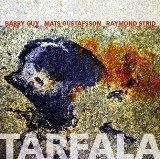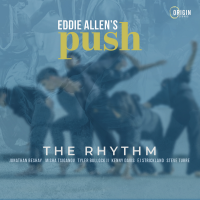Home » Jazz Articles » Profile » Joelle Leandre
Joelle Leandre
I have this utopia vision. I want art to change the world.
—Joelle Leandre
 Joelle Leandre has a huge voice. Not just a formidable singing voice, which can be friendly and frightening, charming and vulgar. And not only on her instrument which can be firmly grounded one moment and soar the next. Leandre's voice unabashedly carries conversation, carries it to unexpected places, making quick turns, never slowing down or backing off. Gender and race, world politics, freedom, jazz—as much of herself as she gives in concert, she can be just as open and direct over a cup of coffee.
Joelle Leandre has a huge voice. Not just a formidable singing voice, which can be friendly and frightening, charming and vulgar. And not only on her instrument which can be firmly grounded one moment and soar the next. Leandre's voice unabashedly carries conversation, carries it to unexpected places, making quick turns, never slowing down or backing off. Gender and race, world politics, freedom, jazz—as much of herself as she gives in concert, she can be just as open and direct over a cup of coffee."Bass players are quite unusual, quite often angry," she said, in just one of many moments in a free flow of recollections and ruminations. "I am an angry player. I have this utopia vision. I want art to change the world. It's impossible just to be a musician and say "oh, life is nice." Life is not nice. Life is hard and to play the bass is hard."
The bass is, of course, the primary thing with which Leandre is identified. Of all the tags one could hang on her—composer, improviser, performer, classically-trained, Frenchwoman, lesbian, brilliant—bassist is the one that matters. The list of people she's worked with embraces innovative music of the second half of the 20th century: in the contemporary classical world, Daniel Barenboim, Pierre Boulez, John Cage, Giacinto Scelsi, Karlheinz Stockhausen, Iannis Xenakis; in free improv, Derek Bailey, Anthony Braxton, Marilyn Crispell, Evan Parker, Barre Phillips, Ir?ne Schweizer and scores more.
For close to three decades, the bass viol has carried her—or, more precisely, she, it—through a remarkable career. It is, to be sure, a relationship of love, if also a contentious one. Although she's been playing it for close to 40 years, she still seems to consider the instrument unwieldy. It's not uncommon for her to complain laughingly about the burdensome double bass during her concerts; she even wrote a piece, "Taxi? (which she performed last September at Columbia University's Festival of Global Jazz), about traveling with her instrument.
"It's a big beast," she said. "To play the bass takes a lot of energy. All bassists know that and if they don't say it, they lie. It's a big empty box and you have to put so much into it. But I love my instrument. Who knows if I was playing clarinet or guitar, if it would be different."
Leandre's lifelong relationship with the bass wasn't love at first sight so much as an arranged marriage. She was studying piano as a teenager when her teacher switched her to bass to fill a need in the student ensemble. "I cried for the first two years," she recalled. "I saw this instrument that was like a body, a person." But her teacher encouraged her and eventually pushed her to go to conservatory in Paris, where she frequented jazz clubs and record stores, discovering fellow bassists Paul Chambers, Charles Mingus, Ray Brown, Charlie Haden and Scott LaFaro and immersing herself in the music of Braxton, Bill Dixon, Alan Silva and Frank Wright.
She went on to work with an orchestra where, she said, she learned a lot about counterpoint and orchestration. "But I stopped myself and said "I don't want to do this my whole life."? She quit in 1970 and sought work with the cutting edge composers of the day. But still she was hungry.
"Quickly I was interested in all this new music," she said. "I was playing all this necrophile music. I wanted to play the music of my century, quit all this and let them sleep.
"The classical background gives you assurance to play anything, because we learn how to play anything—a tango, a foxtrot, a blues," she said. "It gives you strong knowledge of your instrument, but not of music. In the "70s, it was pure chaos. I had just finished my classical studies, went into new music with these complex scores and also went to listen at jazz clubs. Jazz is not only singing. Jazz is a scream, first by the black people: "We exist!? But after a few years it became universal music. What I liked was that spirit of freedom."
With a move to Buffalo, NY, in 1976, the many musics in her mind began to crystallize. She worked with Cage and Morton Feldman and headed down to the city on weekends, going to loft concerts and meeting Leroy Jenkins and Butch Morris, among others. Two years later, she came in contact with the less jazz-influenced free improv scene in Europe: Bailey and Peter Kowald at a festival in London, then Schweizer and the Feminist Improvising Group in Paris. "I was shocked," she said. "It was new to see only women onstage."
That gender balance, she noted, hasn't changed much in the 30 years since.
"At a festival, you have maybe 150 guys and two women," she said. "It's hard, it's bizarre. I play with guys. I like to, I learn, but I could say "where are my sisters?? Men don't talk about it, but they are deep in competition—who will record, how many CDs do you make, who do you play with? I don't think the guys care where the women are. But I think something has to change. In history, artists—filmmakers, painters, composers—they?re mostly men. I think a woman like me with a bass will leave something, because we haven't had a podium. We don't have Beethoven or Wagner or Elvis or Monk."
If Leandre comes off as a little strident, that's because she, at times, is. But she's not a total cynic. She sees an egalitarian spirit in free improvised music (even if she rejects the term) that she says hasn't existed in the other arts.
"To be a woman, a lesbian, helped me maybe, I don't know," she said. "Women in art are seen as witches or crazy or homosexual. It's probably true, by the way. But improvisation is human, it's expression, there's no hierarchy, no gender. Free music? I contest this name. We are not free. Especially musicians. How can you be free when you have a position, the sound of your instrument, a memory?"
That is, for Leandre, the often debated line between jazz—a lineage that stretches back to Satchmo and Bird—and the spontaneous, if nebulous, arena of open improvisation.
"Never will I play the role of a bass in jazz because I am too much of an anarchist and the men do that," she said. "I create my way to be me. I feel more authentic if I play what I play than if I play like somebody. This is your classical music, jazz. I respect it, but it's not my tradition."
And for Leandre, that approach to playing her instrument is also a credo for living her life.
"I could say now with simplicity that I built my life by myself to meet people and fall in love," she said. "I think that's my life—to go to a person and say "Who are you?" Because I know who I am, I am so a bassist. Life is all this contradiction and tension and it's exactly like that when we play. To be alive and open and fragile every day—for me, life is that."
Selected Discography
Francois Houle/Joelle Leandre/Raymond Strid—9 Moments (Red Toucan, 2006)
Joelle Leandre—Concerto Grosso (Jazz Halo, 2005)
Joelle Leandre/India Cooke—Firedance (Red Toucan, 2004)
Joelle Leandre/Marilyn Crispell/Paul Lovens/Richard Teitelbaum, The Joelle Leandre Project (Leo, 2000)
Joelle Leandre, No Comment (Red Toucan, 1995)
Irene Schweizer/Maggie Nicols/George Lewis/Joelle Leandre/Gunter "Baby" Sommer—The Storming of the Winter Palace (Intakt, 1985)
Tags
PREVIOUS / NEXT
Support All About Jazz
 All About Jazz has been a pillar of jazz since 1995, championing it as an art form and, more importantly, supporting the musicians who make it. Our enduring commitment has made "AAJ" one of the most culturally important websites of its kind, read by hundreds of thousands of fans, musicians and industry figures every month.
All About Jazz has been a pillar of jazz since 1995, championing it as an art form and, more importantly, supporting the musicians who make it. Our enduring commitment has made "AAJ" one of the most culturally important websites of its kind, read by hundreds of thousands of fans, musicians and industry figures every month.




























